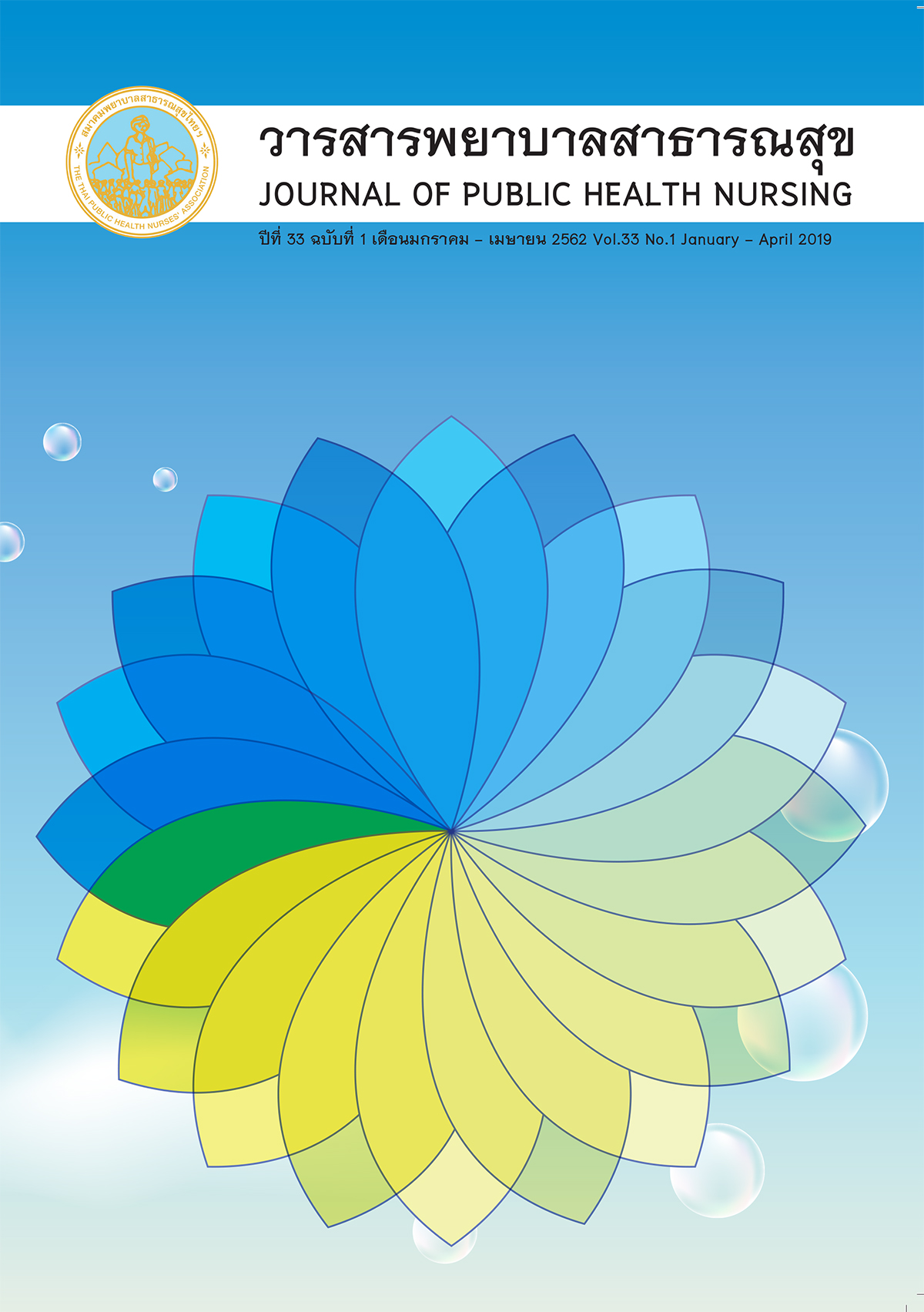Effects of an Empowerment Program on the Knowledge, Empowerment Perception and First aid and Basic Screening of Disease Abilities Among Prison Health Voluntee
Keywords:
Prison Health Volunteers, Empowerment, First aid, Basic Screening of DiseaseAbstract
Prison health volunteers are important position to assist nurses in promoting public health in prisons. This one-group pretest posttest quasi - experimental design aimed to examine the effects of an empowerment program in first aid and basic screening of disease knowledge, empowerment perception, and their abilities. The 81 participants were recruited by purposive sampling. They were trained regarding to 25 hours divided 5 times of empowerment program including first aid and basic screening of disease. Data were collected at a Women Correctional Institution in Lower Northern part of Thailand and analyzed using The Friedman test and Wilcoxon Signed Ranks Test.
The findings showed that prison health volunteers who received the empowerment program became more knowledgeable, empowered and able to provide first aid and basic screening of diseases in their role as health volunteers than before the empowerment program, and they remained knowledgeable and empowered when assessed again twelve weeks after receiving the program.
This empowerment program is effective in promoting first aid and preliminary disease screening knowledge, empowerment perception, and abilities among prison health volunteers. Therefore, this program should be promoted to health volunteers in other prisons so that they will be able to deliver care to other inmates as expected by the prisons.
References
Walmsley R. World Prison Population List (11th Ed.) [Internet]. 2013 [cited 2016 July 15]. Available from http://www.apcca.org/uploads/10th_Edition_2013.pdf
Mansoor M, Perwez SK, Swamy TNVR, Ramaseshan H. A critical review on role of prison environment on stress and psychiatric problems among prisoners. Mediterr J Soc Sci 2015; 6(1): 218-23.
Kouyoumdjian F, Schuler A, Matheson FI, Hwang SW. Health status of prisoners in Canada. CAN FAM PHYSICIAN 2016; 62(3): 215-22.
World Health Organization. Prisons and health [Internet]. 2014 [cited 2016 October 15]. Available from http://www.euro.who.int/__data/assets/pdf_file/0005/249188/Prisonsand-Health.pdf
Jittimanee S, Ngamtrairai N, White M, Jittimanee S. A prevalence survey for smear-positive tuberculosis in Thai prisons. Int J Tuberc Lung Dis 2007; 11(5): 556- 61.
World Health Organization. Good governance for prison health in the 21st century: A policy brief on the organization of prison health [Internet]. 2013 [cited 2016 October 15]. Available from https://www.unodc.org/documents/hivaids/publications/Prisons_and_other_closed_settings/Good-governancefor-prison-health-in-the-21st-century.pdf
Al-Darraji HAA, Kamarulzaman A, Altice FL. Latent tuberculosis infection in a Malaysian prison: implications for a comprehensive integrated control program in prisons. BMC public health 2014; 14(22): 1-9.
De Koning K, Kok M, Ormel H, Kane S, Rashid S, Sarker M, et al. A common analytical framework on factors influencing performance of close-to-community providers. Synthesis of the inter-country context analysis in Bangladesh, Ethiopia, Indonesia, Kenya, Malawi and Mozambique and the international literature review. Amsterdam: KIT/REACHOUT: http://www.reachoutconsortium.org/media/2859/reachout-inter-country-analysis-and-framework-report.pdf; 2014.
Kok MC, Dieleman M, Taegtmeyer M, Broerse JE, Kane S, Ormel H, Tijm MM, deKoning K. Which intervention design factors influence performance of community health workers in lowand middle-income countries? A systematic review. Health policy and planning 2015; 30(9): 1207-27.
Shrestha S. A conceptual model for empowerment of the female community health volunteers in Nepal. EfH 2003; 16(3): 318-27.
Gibson CH. A concept analysis of empowerment. J Adv Nurs 1991; 16(3): 354-61.
Kamoyo, JM. Effects of imprisonment on self-esteem among female inmates in selected prisons in Kenya. ESJ 2018; 14(17): 165-73.
Moein M, Aghajani M, Ajorpaz NM, Khorasanifar L. Effect of an Empowerment Program on Self- Efficacy of Patients with Type 2 Diabetes. Iran Red Crescent Med J 2017; 19(1): e29252.
Kane S, Kok M, Ormel H, Otiso L, Sidat M, Namakhoma I, et al. Limits and opportunities to community health worker empowerment: A multi-country comparative study. Social Science & Medicine 2016; 164: 27-34.
Pengsa-ium V, Chaiyasung P, Yakasem P. Outcome of empowerment program on perceived empowerment and caregiving practice of health care volunteers to dementia of elderly. Journal of Nursing and Education 2015; 8(1): 152-65.
Gibson CH. The process of empowerment in mothers of chronically ill children. Journal of Advanced Nursing 1995; 21(6): 1201-20.
Armstrong G, Kermode M, Raja S, Suja S, Chandra P, Jorm AF. A mental health training program for community health workers in India: impact on knowledge and attitude. International journal of mental health systems 2011; 5(1): 1-11.
Bhatia K. Community health worker programs in India: a rights-based review. Perspectives in public health 2014; 134(5): 276-82.
Health Communication Capacity Collaborative. Factors impaction the effectiveness of community health worker behavior change: A literature review. United States Agency International Development [Internet]. 2015 [cited 2016 July 15]. Available from http://healthcommcapacity.org/wpcontent/uploads/2015/06/Barriersto-CHW-Svc-Provision-Lit-Review-June2015.pdf
Nxumalo N, Goudge J, Thomas L. Out reach services to improve access to health care in South Africa: lessons from three community health worker programmes. Glob Health Action 2013; 6(1): 219-26.
Vichayanrat T, Steckler A, Tanasugarn C. Barriers and facilitating factors among lay health workers and primary care providers to promote children’s oral health in Chon Buri province, Thailand. Southeast Asian J Trop Med Public Health 2013; 44(2): 332-43.
Downloads
Published
How to Cite
Issue
Section
License
บทความที่ตีพิมพ์และแผนภูมิรูปภาพถือเป็นลิขสิทธิ์ของวารสารพยาบาลสาธารณสุข (Thai Public Health Nurses Association)







